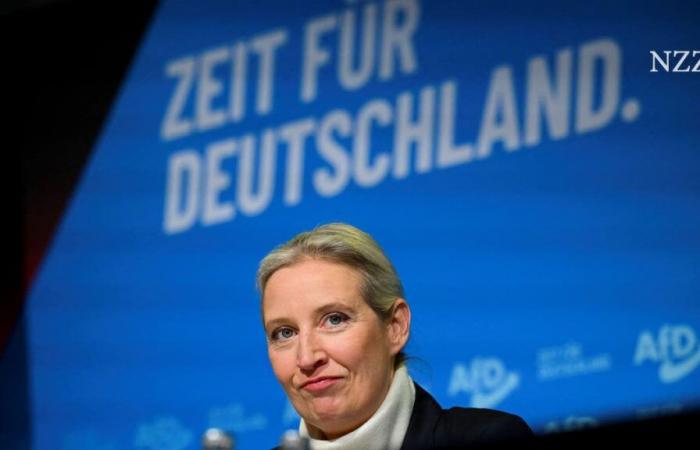The German candidate for chancellor and the American tech billionaire agreed for 75 minutes: Only the AfD can save Germany.
Alice Weidel is the leader and candidate for chancellor of the German AfD.
Annegret Hilse / Reuters
The conversation between American tech billionaire Elon Musk and Alice Weidel, head of the German right-wing party AfD, was eagerly awaited this Thursday evening. The tech mogul who had previously declared the AfD to be Germany’s last glimmer of hope had offered it.
NZZ.ch requires JavaScript for important functions. Your browser or ad blocker is currently preventing this.
Please adjust the settings.
The exchange on Musk’s Platform X did not offer any surprises. Both sides were in admiration for each other. Musk gave Weidel the cues. In the end, the proof that only the right-wing AfD could save Germany from decline was sufficiently proven from both perspectives.
English with a strong German accent
Weidel joins the conversation from Berlin. The two chatted in English for almost 75 minutes. Weidel’s English is good, but not perfect. Her accent has a strong German tinge. Sometimes she looks for the right word. Once an employee helps. They both laugh a lot.
Weidel paints the situation in her country in the darkest colors, seeing only state failure everywhere and a political class at work that she is not sure whether it is just incompetent or evil. Initially the conversation revolves around the mistakes of the German energy transition. You can’t power an industrial country with wind and sun, says Deutsche.
Musk doesn’t contradict her, but does want to add that he thinks solar energy is great. It is important to have a good mix of renewable and fossil, but above all nuclear, energy. Musk recommends that Germany not only bring the nuclear power plants that have been shut down back online, but also expand nuclear power. “Absolutely,” says Weidel. “We stand for diversity in energy supply.”
Unsurprisingly, the talk soon turns to German migration policy in recent years. Weidel calculates that millions of people have entered the country and the German social system illegally since 2015. The state continually fails to protect the borders. She almost seems a little disappointed when Musk reports that something similar is happening on the southern border of the USA. There, too, migrants throw away their documents to avoid deportation. “Crazy,” says Weidel.
We also talk about Germany’s excessive bureaucracy. Musk reports on how big the approval effort was for the factory of the company he founded, Tesla, near Berlin. The application ultimately consisted of 25,000 pages. And they should have been printed out too.
Musk explicitly promotes the AfD
At some point, Musk inserts the first commercial break. “If you are dissatisfied with the situation, you have to vote for change,” he addressed the Germans. Weidel is not suggesting anything offensive. Only the AfD could save Germany. “End of story.”
Musk nevertheless asks Weidel to respond to the Nazi allegations against her party. She argues from economics. Hitler was an anti-Semitic socialist and communist. But your party is libertarian and conservative. In this respect, the AfD has nothing to do with Hitler. Later, in response to Musk’s question, she will “clearly” declare her support for Israel.
After an hour the conversation runs out of steam. “Do we have any more questions?” asks Musk. Weidel asks the space entrepreneur when the first human expedition will arrive on Mars. Musk explains and explains and is clearly in his element. Weidel’s employees are likely to be annoyed about the broadcast minutes that were wasted from the party’s perspective. Weidel seems genuinely interested in Musk’s views. She asks if he believes in God. He doesn’t. She also identifies as an agnostic. At some point Weidel ends the conversation.
“Those are the perfect last words for our conversation,” says Weidel, winding a few more garlands for Musk, the visionary. “Thanks, I hope it was helpful,” he replies before switching off the space. Weidel appears to have passed the interview to win favor with the Trump camp.
Musk and AfD could face legal difficulties
It remains to be seen whether the conversation will have unpleasant consequences for Musk. According to a report by the “Politico” portal, it was planned that up to 150 EU Commission officials would follow the conversation with a view to possible breaches of the law. The exchange itself was not forbidden. However, it would be a violation of European law if the X owner Musk had ensured greater visibility of the conversation. If that were the case, it would put an additional burden on him in his existing legal dealings with the EU.
But the AfD may also have to expect legal consequences. In any case, the administration of the German Bundestag is checking whether Musk’s – free – conversation offer could be covert and therefore illegal party financing and interference in the election campaign.
Politically, the AfD has already benefited from Musk’s support. According to a survey published at the weekend, 29 percent of Germans who are eligible to vote and intend to vote agree with Musk’s statement that the AfD is Germany’s last hope. The party itself only gets around 20 percent in surveys. Weidel, who will be officially named her party’s candidate for chancellor at the weekend, will try to use the opportunity and turn the potential into approval for her party in the remaining weeks until the federal election.






